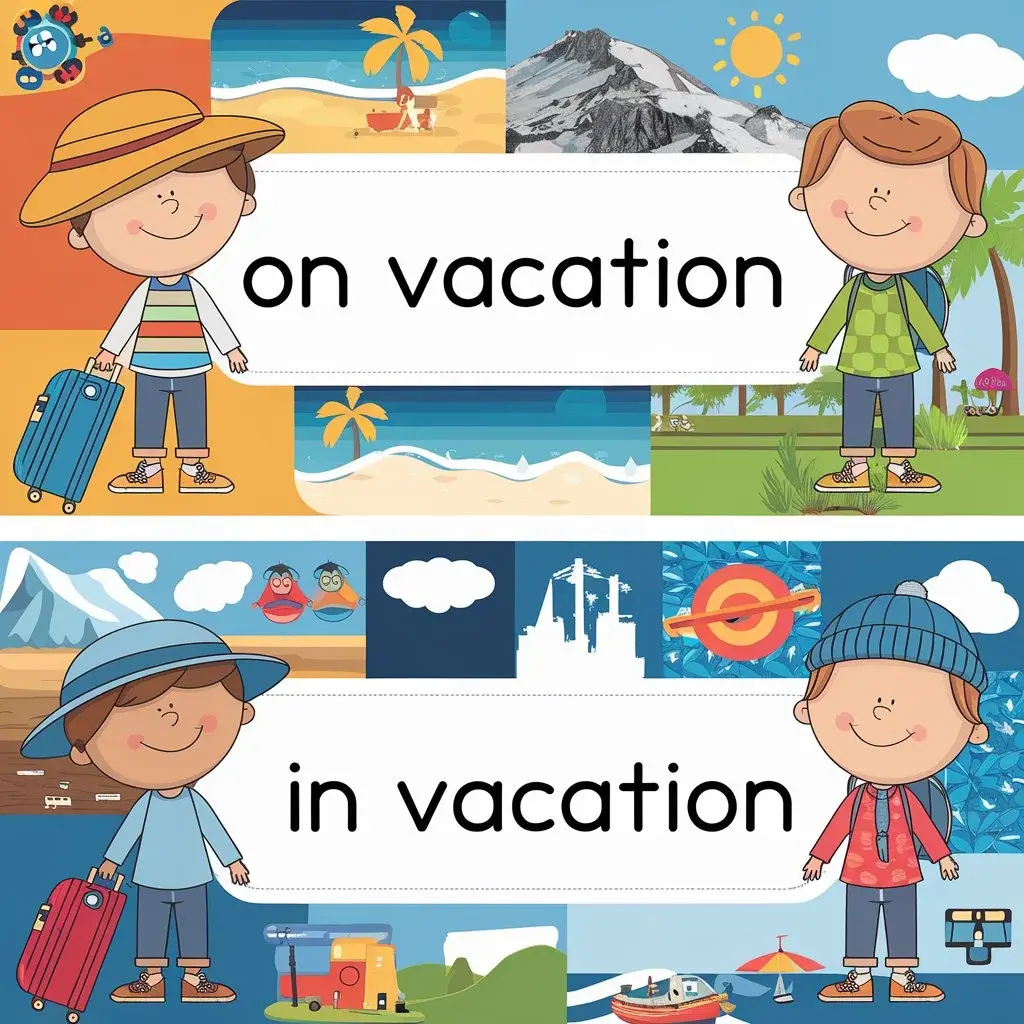Knowing whether to use “on vacation” or “in vacation” is essential when you’re telling people about your plans or setting up an auto-response email. Let’s break down these two options and clarify which is correct. When it comes to discussing time off from work, there’s often confusion about whether to say “on vacation” or “in vacation.” Understanding the correct phrase is essential, especially when you’re letting others know about your plans or setting up an auto-response email.
The English language has specific rules about which preposition to use in different contexts, and using the wrong one can sound awkward. In this post, we’ll break down the right way to express your time away and explore some helpful alternatives. Let’s dive into the nuances to make sure you’re always using the correct term.
Is It “On Vacation” or “In Vacation”?
The correct phrase is “on vacation,” and “in vacation” is never used in English. We use “on vacation” because it suggests that we are either planning or currently taking part in a holiday or a break from work. The phrase implies participation in a relaxing or leisurely activity. While you might also hear “on a vacation,” the two phrases are mostly interchangeable, though there are some subtle differences we’ll explore later.
What Does It Mean to Go On Vacation?
When you say you’re going “on vacation,” it means you’re traveling somewhere, either within your country or abroad, to enjoy some time away. A vacation is often associated with relaxation or exploring new cultures and destinations. It is a period when you are away from your job, usually taking time to refresh and unwind. Many workplaces allow a specific number of weeks per year for employees to take vacations.
Everyone looks forward to taking their vacation, which can happen any time of the year. Some people prefer to travel to warmer climates during the winter months when it’s cold at home, while others opt to visit exotic destinations during the summer to experience something new. In both cases, the goal is to relax and recharge.
Is It More Common to Say “On Holiday” or “On Vacation”?
The choice between “on holiday” and “on vacation” depends on where you live. In American English, the term “on vacation” is the more commonly used phrase to describe time off from work. However, in British English, people say “on holiday” instead, as the word “vacation” isn’t widely used in the UK.
This difference is important to note if you’re working for an international company. If you work for a U.S. company, stick with “on vacation.” If your workplace follows British English rules, “on holiday” will be more appropriate.
What Should You Write in Your Auto-Response Email?
When it comes to writing an auto-response email, getting the phrasing right is not as crucial as many believe. Your auto-response should be short and straightforward. Instead of saying you’re “on vacation,” you can simply write, “I am out of the office until [date].” This message is all that’s needed.
Whether you’re out for a vacation, a medical procedure, or dealing with bereavement, the recipient doesn’t need to know the specifics. Keep the message professional and concise.
Is It Correct to Say “On a Vacation”?
While “on a vacation” and “on vacation” are largely interchangeable, there are slight differences in how they are used. Typically, “on vacation” is more common when referring to immediate or upcoming plans. For example:
- “I’m going on vacation this weekend.”
On the other hand, “on a vacation” is more likely to be used when talking about future plans that are further out. For example:
- “I’m going on a vacation this summer.”
Despite this nuance, most people use “on vacation” in both cases without issue.
Is It Correct to Say “On the Vacation”?
Unlike “on a vacation,” the phrase “on the vacation” should never be used. There’s no need to make the term “vacation” specific in this way, even if you are referring to a particular trip. Instead, stick to “on vacation.”
However, you might say “the vacation” when referring to a specific trip, as in:
- “The vacation to the U.S. was excellent.”
But remember, “on the vacation” is never correct.
Is It “On Vacation Mode” or “In Vacation Mode”?
When talking about being in vacation mode, most people use the phrase “in vacation mode.” This refers to a mental state where you’ve shifted from work-focused thinking to excitement about your upcoming break. While we say “on vacation” to describe the actual event, “in vacation mode” makes sense when describing a mental or emotional state.
Examples
- I won’t be checking emails next week because I’ll be in vacation mode.
- She’s so relaxed, it’s like she’s already in vacation mode.
- As soon as we landed at the beach, we were officially in vacation mode.
- I’m still working, but my mind is already in vacation mode.
- Once I turned on the out-of-office reply, I felt like I was truly in vacation mode.
- With no meetings today, I’m fully in vacation mode.
- You can tell he’s in vacation mode by the way he’s been dressing casually all week.
- After a long year, I’m finally in vacation mode and ready to relax.
- She set her phone to silent and went completely in vacation mode.
- It’s hard to concentrate when you’re mentally in vacation mode already!
Alternative Ways to Say “On Vacation”
Let’s finish with some alternative ways to say you’re “on vacation.” Whether you want a more professional-sounding phrase for work or just something a little different, here are a few options:
- “On holiday” – This is more common in British English but is still understood in the U.S.
- “On break” – This phrase implies a temporary time off from work and is widely used.
- “Respite” – This formal term means a break from work, though it’s mostly used in professional or serious contexts.
By understanding these options, you can confidently talk about your vacation plans and keep your communication clear, whether in emails or conversations.
FAQs
Is “in vacation” ever correct to use?
No, “in vacation” is never used in English. The correct phrase is always “on vacation,” as it indicates participation in a holiday or time off. Saying “in vacation” would sound unnatural and confusing to native English speakers. You might hear the phrase “in vacation mode,” which is acceptable because it refers to a mental state of relaxation, but otherwise, stick to “on vacation” when talking about a holiday.
What does “on vacation” mean?
When someone says they are “on vacation,” it means they are taking time off from work to relax, travel, or enjoy personal activities. It usually involves traveling to a different location, whether domestically or internationally. Being “on vacation” implies that you’re temporarily away from your regular responsibilities, often for relaxation or exploration. The term can also refer to short breaks or extended holidays, depending on the context. Essentially, it signifies a period of leisure and rejuvenation.
Can I say “on a vacation”?
Yes, you can say “on a vacation,” but it’s less common than “on vacation.” The phrase “on a vacation” is typically used when you want to be more specific about the event or if it’s happening in the future. For example, you might say, “I’m going on a vacation this summer.” In contrast, “on vacation” is more general and often used for plans happening in the near future. Both phrases are grammatically correct, but “on vacation” is more widely accepted in everyday conversation.
Why do we say “on vacation” instead of “in vacation”?
We say “on vacation” because the preposition “on” implies participation in an activity or event, like “on a trip” or “on a break.” The word “vacation” is treated similarly, suggesting that someone is currently engaged in time off. In contrast, using “in” would make it sound like you are inside something, which doesn’t fit the concept of being on holiday. English prepositions can be tricky, but “on vacation” has become the standard phrase over time.
How should I write my auto-response email for a vacation?
Your auto-response email should be brief and professional. Instead of saying, “I am on vacation,” it’s more efficient to write, “I’m out of the office until [date].” You don’t need to give reasons for your absence, whether it’s a vacation or another matter, such as medical leave or bereavement. The goal is to keep your message clear and to the point, allowing the recipient to understand when you’ll be available again. This approach ensures you maintain a professional tone while keeping things simple.
What’s the difference between “on vacation” and “on holiday”?
The difference between “on vacation” and “on holiday” depends on where you live. In American English, the term “on vacation” is the most commonly used phrase, while “on holiday” is more prevalent in British English. Despite the difference, both phrases mean the same thing: taking time off from work to relax or travel. Understanding these regional variations is helpful if you’re working or communicating internationally. Whether you say “on vacation” or “on holiday,” both phrases are correct in their respective contexts.
Conclusion
Choosing the correct phrase, whether “on vacation” or “on holiday,” is important when expressing your time away from work. While regional differences exist, the most important thing is to understand when and how to use these phrases correctly. Whether you’re preparing for an auto-response email or simply letting friends know your plans, always use “on vacation” in American English and “on holiday” in British English. By mastering these nuances, you can communicate clearly and confidently. As the quote goes, “A vacation is what you take when you can no longer take what you’ve been taking.” Make the most of your time off and enjoy the break!

I’m Mira Sinclair, the expert helping you navigate grammar sections at “Grammer Grove.” Playing with words and expressions is my thing. At Grammer Grove, we’re here to make yourwriting stand out and shine. Let’s make your appreciation heartfelt and memorable—come and join the fun at Grammer Grove!












